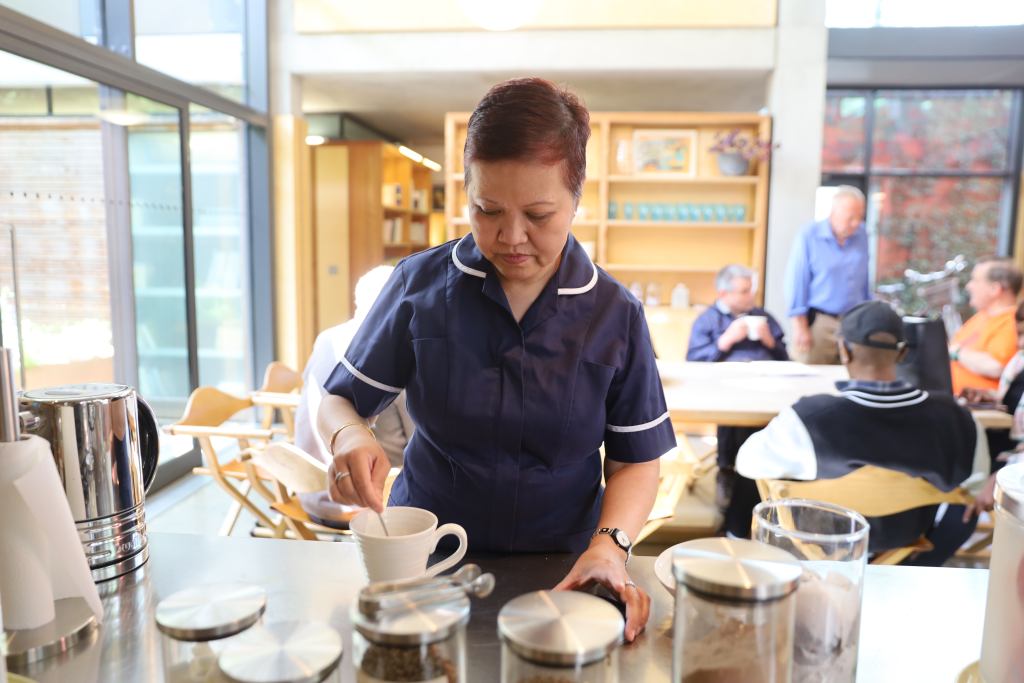Forty per cent of people with cancer in the UK have used annual leave for their appointments rather than telling their employer it is for cancer treatment, according to a new survey from cancer support charity Maggie’s.
The survey, of 100 people with cancer, was conducted by OnePoll* on behalf of the charity to help understand how people with cancer can be better supported in the workplace – by employers and their colleagues.
It also found that almost a quarter (22%) of people only told their colleagues about their diagnosis once it became apparent due to treatment. The main reasons for not telling colleagues were not wanting to be treated differently by colleagues (20%), worried it might distract colleagues and affect team productivity (20%) and wanting to keep medical condition private (20%). Ten per cent of those surveyed did not feel supported by their employers when they told them about their diagnosis.
Nancy, 53, a nurse from West London was diagnosed just before her 50th birthday. During her treatment Nancy told us she had used disability leave but also annual leave for her hospital appointments. She said: “I moved to the UK in 2001 when I was 31. I came to Northern Ireland from the Philippines with my son and my then husband. The rest of my family is still in the Philippines. I came over to build a future for me and my son.
“I had come to the UK to make a life for us, but now life was even tougher. Money was tight, everything I had saved was gone. I was just about to turn 50 and I was told I had cancer.
“I had to use my annual leave to attend the treatment. It would take a day and if I didn’t take it off as annual leave I would have had to rush back to work after the treatment. When you’ve had something like cancer, you would rather keep it in yourself because your self-esteem is too low. You would rather not many people know about it. I wanted to be strong, get better, get back to work. I was thinking about being strong for my son and for me. But I realised quickly that I couldn’t do those things as I used to. I found myself gasping for breath just trying to vacuum the house.”
Dame Laura Lee, Chief Executive of Maggie’s said: “Telling anyone you have cancer can be a really scary and overwhelming thing to do but telling your employers and colleagues adds another level of stress. People coming into our centres tell us that they worry about job safety, being treated differently and knowing what they can or should say about taking time off for treatment and appointments, and these are all really valid worries that our staff can help with.
“Everyone diagnosed with cancer should be aware that they have employment rights but also know that also they don’t have to tell colleagues until they’re ready, if at all.
“Our professional staff can help you figure out when the time is right to discuss your cancer, and what to say and to who. They can also advise on your rights, returning to work and financial support when you’re out of work.”
Maggie’s professional staff include psychologists, cancer support specialists and benefits advisors, all of whom offer free advice on everything from treatment choices, stress, anxiety and talking to friends, family and employers. Our centres also run Cancer in the Workplace courses to help employers understand the needs of employees with cancer or who have family and friends with cancer.
Since Maggie’s opened its first centre in 1996, the charity has developed a programme of support that is proven to help people with cancer, as well as family and friends, take back control and to help make the hard conversations a little easier.
To find out more about Maggie’s and to find your nearest centre visit www.maggies.org
Top Three Tips for Returning to Work from Neil Murray, a Benefits Advisor at Maggie’s Oldham
Claiming Benefits
*Many people assume they will only receive benefits on the basis of not being able to work but it doesn’t work like that. You may still be able to work full-time and claim benefits. Check with your nearest Maggie’s to see how your benefits will be affected.
Telling Colleagues
*You have a say in what your colleagues are told about your diagnosis or what you might have been through. You could ask your manager to send round an email to your immediate team to let them know some basic info. This could help you to avoid that situation when you do go back to work of feeling you have to go around telling people individually on your first day back. Alternatively, you might feel more comfortable speaking with a small group of colleagues that you are comfortable with yourself.
Reasonable Adjustments
*Your employer has to make reasonable adjustments to enable you to return to work. Before going back to work, give some thought as to what might help on your return. A phased return can be helpful where someone might return to work part-time initially, slowly working up to longer hours. Working from home might also be an option. If you’re worried about fatigue, it may be worth suggesting to your employer that you will need more regular breaks.
Although you might feel pressurised to return to work for financial reasons, bear in mind going back to work too soon can mean time off further down the line when you should have given yourself more time to recuperate.



